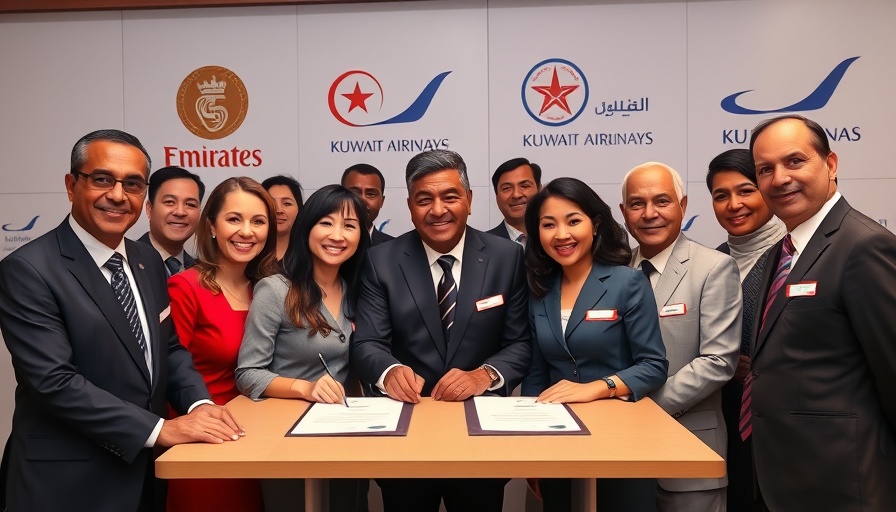
Navigating the New Interline Agreement: What It Means for Travelers
As the travel industry gradually rebounds from recent disruptions, the announcement of an interline agreement between Kuwait Airways and Emirates presents an exciting opportunity for affluent travelers seeking enhanced connectivity. Signed at the Arabian Travel Market in Dubai, this agreement signifies a critical growth phase in both airlines' collaboration and extends competitive options for passengers flying between Kuwait, Dubai, and global destinations.
The Significance of the Agreement
Kuwait Airways Chairman, Captain Abdulmohsen Salem Al-Fagaan, highlighted the importance of this Memorandum of Understanding (MoU), which aims to deepen commercial agreements and foster bilateral partnerships. "We welcome Emirates as an important strategic partner," Al-Fagaan remarked, signaling that the partnership will significantly benefit commercial operations.
This agreement is poised to streamline travel experiences for passengers, as they can now easily connect to an extensive network of destinations beyond the airlines' current offerings, enhancing their travel prospects significantly.
Exploring Expanded Travel Opportunities
For luxury travelers, the benefits of this interline agreement are manifold. Not only does it broaden access to various destinations, but it also promises the potential for seamless travel experiences—from booking and check-in to baggage handling. People interested in traveling through the Middle East can leverage the combined routing options that this partnership opens up, making adventurous getaways more attainable and convenient.
Additionally, the agreement bolsters the foundational ties among nations within the region, particularly between Kuwait and the UAE, fostering stronger tourism and commercial relations.
Potential Impacts on Hospitality Trends
Travelers are often drawn to high-end hotels that provide luxurious amenities and personalized services. With the increased air travel facilitated by the Kuwait Airways and Emirates agreement, hotels in both Kuwait and Dubai are likely to anticipate higher occupancy rates. This partnership may stimulate hotel investments, renovations, and the emergence of boutique hotels aiming to attract affluent travelers.
As airline partnerships grow stronger, so too do networking opportunities for luxury hotels, enhancing their market presence in terms of hotel acquisitions and promotional strategies that cater to affluent clientele.
Looking Toward Future Collaboration Trends
The MoU marks a significant milestone in the evolution of airline collaborations, hinting at future agreements that may emerge between various carriers aiming to improve travel connectivity. In light of this, it is worth exploring how such partnerships could transform passenger experiences further, particularly for those seeking luxury travel options.
This agreement provides a glimpse into how the industry is adapting post-pandemic, and as travel resumes, observers expect more airlines to engage in similar strategic partnerships, reflecting the innovative directions within the sector.
Final Thoughts: A New Era of Travel Connectivity
The recent interline agreement between Kuwait Airways and Emirates stands as a beacon for travelers yearning for greater flexibility and options in their travel plans. As this partnership unfolds, affluent travelers should keep an eye on emerging hospitality trends that may enhance their travel experiences, from better connections to upgraded hotel accommodations.
With the luxury market poised for further growth, this agreement not only speaks volumes about the resilience of the aviation industry but also underlines the evolving landscape where partnerships are crucial for success and innovation. Keep your travel plans attuned to the dynamics of these alliances and the luxurious accommodations that await.
Contact us today at www.sitinmyseats.com for more information or to book a free travel consultation!
 Add Row
Add Row  Add
Add 




 Add Row
Add Row  Add
Add 
Write A Comment